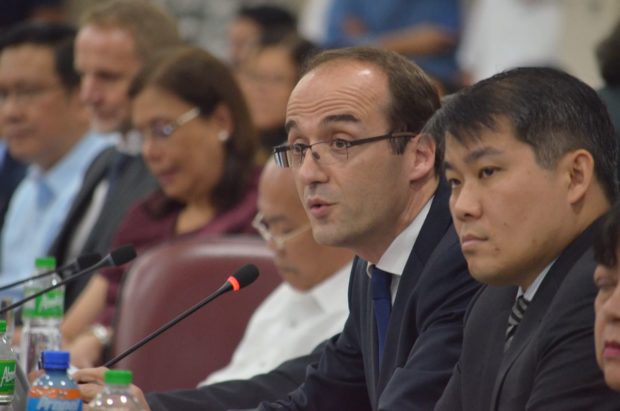Sanofi official confirms company meet with Aquino in Paris

Sanofi Pasteur representative Thomas Triomphe. NOY MORCOSO/INQUIRER.net
The Asia-Pacific head of Sanofi Pasteur on Wednesday confirmed that then President Benigno Aquino III and his finance secretary, Cesar Purisima, met with officials of the French pharmaceutical giant in December 2015 to discuss the company’s products, including the controversial Dengvaxia dengue vaccine.
Testifying at a hearing on the Dengvaxia controversy called by the House of Representatives’ health and good government committees, Thomas Triomphe, Asia-Pacific vice president of Sanofi Pasteur, said he was present at the meeting in Paris, which was part of courtesy visits on Aquino during an international conference.
Dengvaxia presentation
Triomphe said Sanofi representatives made a presentation on the company’s pipeline products, including the Dengvaxia vaccine that at the time had been submitted for registration in the Philippines.
“We discussed Dengvaxia vaccine in the meeting, knowing that Dengvaxia had been submitted for registration,” Triomphe said.
Article continues after this advertisementSurigao del Sur Rep. Johnny Pimentel, chair of the good government committee, noted that some Aquino officials who confirmed the meeting had denied Dengvaxia was on the agenda of the meeting.
Article continues after this advertisement“We cannot but help suspect there was persuasion and agreement to sell Dengvaxia to the Philippines,” Pimentel said.
Triomphe said it was not a question of selling.
Presentation
“It was a question of presenting the pipeline of Sanofi, including Dengvaxia vaccine,” he said, adding that similar presentations were made in many other countries to show the efficacy and safety of the vaccine.
Triomphe was also forced to apologize during the hearing for the “misunderstanding” sparked by Sanofi’s statement in November that drew a public uproar and stoked fears of a nationwide health crisis.
The statement was about the Dengvaxia vaccine making symptoms worse in vaccinated people who had not been previously exposed to the dengue virus.
After the Sanofi statement, the Department of Health (DOH) halted a P3.5-billion immunization program under which more than 830,000 schoolchildren aged 9 and over had received at least one dose of Dengvaxia.
‘I am sorry’
“I am sorry if it has created confusion, which is why I came here to say there is no need to panic,” said Triomphe, who appeared at a joint hearing of the House health and good government and public accountability committees.
He apologized after he was castigated by Sagip Rep. Rodante Marcoleta for his company’s “insensitivity” to the concerns of the Filipino public.
“I want you to say sorry profusely. I want you to say sorry honestly… Please be considerate in your statements and be sensitive. This is our society. This is not Paris,” Marcoleta told Triomphe.
“I do understand the concerns,” Triomphe said. “That is why I want to provide the facts and I want people to understand there’s no need to panic. I do apologize if there’s a misunderstanding.”
Under questioning by Nueva Ecija Rep. Estrellita Suansing, Triomphe insisted there was “no contradiction” between Sanofi’s first press release on Nov. 29 and its subsequent statements that appeared to play down the risks in the aftermath of the public uproar.
“There is no contradiction,” he said.
Turnaround
He reiterated the points he made during the Senate hearing on Monday that the initial advisory indicated that people who had not previously been immunized with Dengvaxia stood only a 0.02 percent increased risk of getting dengue.
But Health Secretary Francisco Duque III, who was at the hearing, said it was clear that Sanofi had made a turnaround.
Duque noted that the Nov. 29 press statement of Sanofi stated that schoolchildren who had never had a history of dengue, or “seronegative persons,” were observed to have severe dengue symptoms.
“After four days they came out with a subsequent press release stating that the symptoms we observed during the clinical trial were Grade 1 and 2 symptoms. I suspect they did observe Grade 3 symptoms, but they did not want to reveal this because the public uproar had reached a crescendo,” Duque said.
Grade 3 dengue symptoms refer to “moderate to severe” cases, Duque explained.
But Triomphe said later that the term “severe dengue” was used because it was the term used in clinical trials.
He said that since 2010, an independent monitoring committee had been the one conducting surveillance on Sanofi’s clinical trials of Dengvaxia and not the company itself.